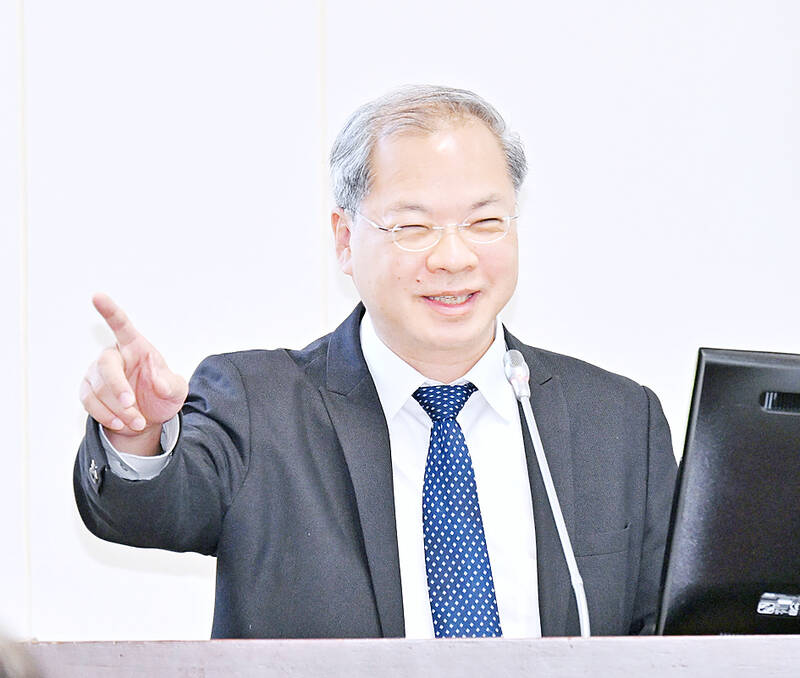The government could revise the rules on the use of nuclear power, if the public agrees, to meet electricity needs to drive economic growth and industrial development, National Development Council (NDC) Minister Kung Ming-hsin (龔明鑫) said yesterday.
Kung made the remarks in response to opposition lawmakers who said that minister of economic affairs-designate J.W. Kuo (郭智輝) called nuclear power “a clean energy source” during his courtesy visit to the legislature one day earlier.
Opposition lawmakers and trade groups have pressed the Democratic Progressive Party (DPP) government to reconsider phasing out nuclear power in the pursuit of net zero carbon emissions next year, saying that nuclear power is cheaper and environmental hazards could be controlled.

Photo: Fang Pin-chao, Taipei Times
The government would go ahead and raise the share of renewable energy sources in line with its pursuit of a nuclear-free policy, said Kung, who is to serve as Cabinet secretary-general after the power transition next week.
“Authorities could revisit the issue if there is a change to the energy policy or the power mix,” he said at a meeting of the legislature’s Economics Committee in Taipei.
If a majority of Taiwanese favor rule changes, the issue would be open for discussion, Kung said.
Taiwan’s current renewable energy output falls way behind the 20 percent target for next year, but the government would strive to bolster its contribution, NDC Deputy Minister Kao Shien-quey (高仙桂) said.
Coal and gas generated 77.6 percent of energy last year, while renewable energy accounted for 10.5 percent and nuclear power plants supplied 6.31 percent, Taiwan Power Co (Taipower, 台電) said in January.
Green energy sources would remain insufficient, because Taiwan’s economy grows rapidly and depends heavily on power-consuming technology firms to meet fast-growing global demand for artificial intelligence applications, Kao said.
Taiwan Semiconductor Manufacturing Co (TSMC, 台積電), the world’s largest contract maker of advanced chips, consumes the bulk of electricity to fulfill orders from Apple Inc, Nvidia Corp, Intel Corp, Advanced Micro Devices Inc and other technology giants.
The EU counts nuclear power as a low-carbon alternative to fossil fuels, with stiff safety and waste disposal requirements, meteorologist Peng Chi-ming (彭啟明), who is to be the new minister of environment, said during an online interview on Wednesday.
A high social consensus would be necessary for the incoming administration of president-elect William Lai (賴清德) to extend the service of existing nuclear power plants, as the move would contradict the stance of outgoing President Tsai Ing-wen (蔡英文), Peng said.
Electronics maker Pegatron Corp (和碩) chairman Tung Tzu-hsien (童子賢) during said that he used to oppose nuclear power, but had changed his stance, as the safety issue has become manageable due to technological progress.
Green energy farms also pose environmental hazards, but in a less evident manner, Tung said.
Tung had turned down Lai’s invitation to be premier after protest from his family, he said.

Taiwan Semiconductor Manufacturing Co (TSMC, 台積電), the world’s biggest contract chipmaker, booked its first-ever profit from its Arizona subsidiary in the first half of this year, four years after operations began, a company financial statement showed. Wholly owned by TSMC, the Arizona unit contributed NT$4.52 billion (US$150.1 million) in net profit, compared with a loss of NT$4.34 billion a year earlier, the statement showed. The company attributed the turnaround to strong market demand and high factory utilization. The Arizona unit counts Apple Inc, Nvidia Corp and Advanced Micro Devices Inc among its major customers. The firm’s first fab in Arizona began high-volume production

VOTE OF CONFIDENCE: The Japanese company is adding Intel to an investment portfolio that includes artificial intelligence linchpins Nvidia Corp and TSMC Softbank Group Corp agreed to buy US$2 billion of Intel Corp stock, a surprise deal to shore up a struggling US name while boosting its own chip ambitions. The Japanese company, which is adding Intel to an investment portfolio that includes artificial intelligence (AI) linchpins Nvidia Corp and Taiwan Semiconductor Manufacturing Co (TSMC, 台積電), is to pay US$23 a share — a small discount to Intel’s last close. Shares of the US chipmaker, which would issue new stock to Softbank, surged more than 5 percent in after-hours trading. Softbank’s stock fell as much as 5.4 percent on Tuesday in Tokyo, its

COLLABORATION: Softbank would supply manufacturing gear to the factory, and a joint venture would make AI data center equipment, Young Liu said Hon Hai Precision Industry Co (鴻海精密) would operate a US factory owned by Softbank Group Corp, setting up what is in the running to be the first manufacturing site in the Japanese company’s US$500 billion Stargate venture with OpenAI and Oracle Corp. Softbank is acquiring Hon Hai’s electric-vehicle plant in Ohio, but the Taiwanese company would continue to run the complex after turning it into an artificial intelligence (AI) server production plant, Hon Hai chairman Young Liu (劉揚偉) said yesterday. Softbank would supply manufacturing gear to the factory, and a joint venture between the two companies would make AI data

The Taiwan Automation Intelligence and Robot Show, which is to be held from Wednesday to Saturday at the Taipei Nangang Exhibition Center, would showcase the latest in artificial intelligence (AI)-driven robotics and automation technologies, the organizer said yesterday. The event would highlight applications in smart manufacturing, as well as information and communications technology, the Taiwan Automation Intelligence and Robotics Association said. More than 1,000 companies are to display innovations in semiconductors, electromechanics, industrial automation and intelligent manufacturing, it said in a news release. Visitors can explore automated guided vehicles, 3D machine vision systems and AI-powered applications at the show, along